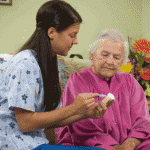Recovering After A Stroke: What You Need To Know
 You never thought it would happen to you, but it did. You had a stroke.
You never thought it would happen to you, but it did. You had a stroke.
Now what?
Life after a stroke is often riddled with fear, apprehension, and uncertainty for loved ones and the stroke survivor alike. Knowing what to expect alleviates these worries and ensures a healthier recovery.
Rehabilitation is about returning to life as usual, so it’s vital to understand the recovery process and how it works. Here are some things you need to know after you’ve had a stroke.
What To Expect After A Stroke
Your ability to recover after a stroke depends on which part of your brain was affected, how much of the brain was damaged, and your overall health before the stroke.
Your body may be affected in several ways. You may experience:
- Partial body weakness – An inability to hold or pick up objects, walk steadily, and perform other basic tasks may arise after a stroke.
- Joint stiffness – Joints can become locked when experiencing a stroke. Contrary to popular belief, moving the joint is the best way to avoid future complications.
- Muscle movements – Muscle spasms are the result of nerve damage and are often experienced by stroke patients. Fortunately, these unpleasant spasms are treatable with medication.
- Recognition impairment – Inability to distinguish between hot and cold or different parts of the body is common after a stroke.
- Cognitive, speech, and mobility impairment – From numbness to emotional instability, suffering a stroke can result in permanent damage.
You may experience some or all of these problems after a stroke, but a good rehabilitation program will help you with your recovery.
How Long Does Recovery Take?
Each stroke survivor will have different needs, so progress and recovery will be different for each person. Work closely with your doctor to determine what expectations you should have for your recovery. Make sure to ask!
What Does A Rehabilitation Program Involve?
Rehabilitation is essential for people who have survived a stroke. Often, stroke survivors face the challenge of relearning daily activities, such as getting dressed or learning to walk again.
Stroke rehabilitation helps survivors learn to live independently again.
After suffering an accident or injury, physical rehabilitation can help improve your independence by slowly working on life skills. Rehabilitation professionals help people regain mobility, endurance, and personal care skills. From social skills and speech therapy to improved memory recall and enhanced problem solving, rehabilitation helps people experience a higher quality of life.
When Will I Begin Rehabilitation?
Your physician will determine when you’re ready to begin rehabilitation. Most rehabilitation services require a doctor’s order, and services are provided in many different places such as nursing homes, long-term care facilities, outpatient facilities, or even at home through home health organizations.
Where you begin your rehabilitation depends on your needs and what strategies will be best for your recovery.
Who Will Help You Recover?
Because every stroke is different, treatment will be different for each person. There are several medical professionals who will oversee and be involved with your rehabilitation:
- Physicians – Patients who are in rehabilitation after a stroke will have a physician in charge of their care. Doctors with rehabilitation experience may be family physicians, internists, geriatricians, neurologists, and physiatrists.
- Nurses – Nurses who specialize in stroke rehabilitation care for people with disabilities. They provide direct care, educate patients and families, and help coordinate care with the physician.
- Physical therapists – Physical therapists evaluate and treat patients with their movement, balance, and coordination. Therapists provide training and exercises that improve walking, getting in and out of a bed or chair, and performing other routine tasks that are often difficult following a stroke. They will also teach family members how to help with exercises for the patient and how to help the patient move.
- Occupational therapists – Occupational therapists provide exercises and practice sequences that help patients do things they did before the stroke like eating, bathing, dressing, writing, or cooking.
- Speech language pathologist – Speech language pathologists help patients regain language skills and teach other strategies for communication. They also work with patients who have problems swallowing.
Stroke recovery and rehabilitation may seem daunting to the stroke survivor, and physical and emotional support is important during every step.
Life after a stroke may pose some challenges, but having a network of medical professionals and a family who cares is half the battle.
IMPORTANT NOTE: You must consult with your doctor! Before starting, stopping, or changing any part of your diet, supplants, medication, exercise routine, or anything related to your health or a medical issue, please consult your doctor first.
Category: Health and Wellness Resources



